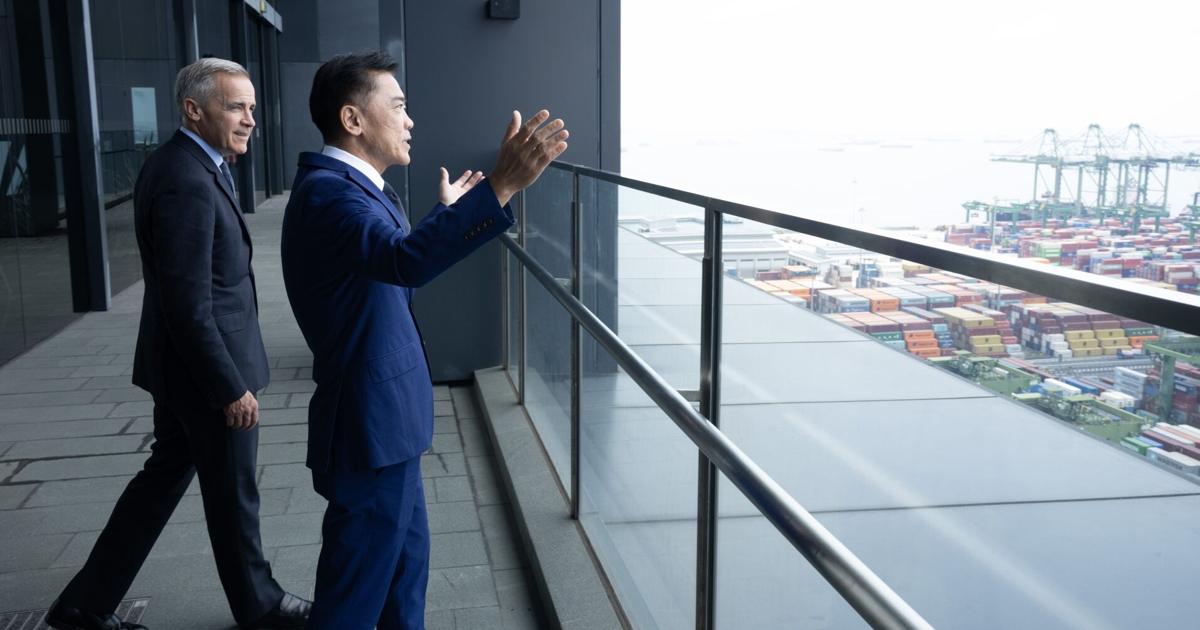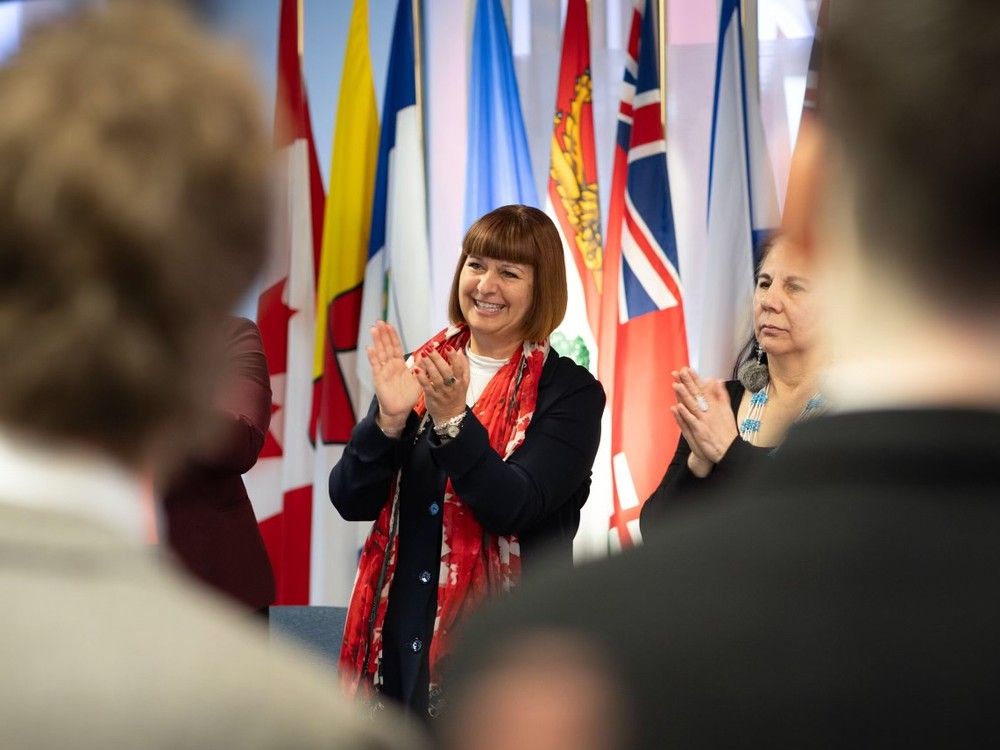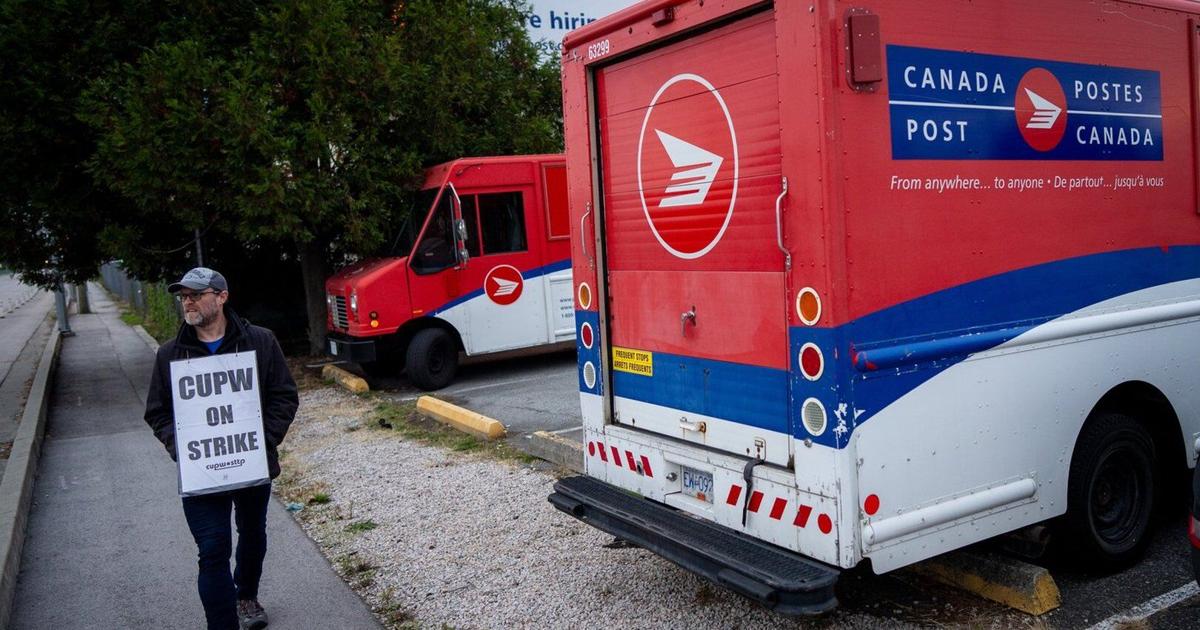OTTAWA — It’s all on Prime Minister Mark Carney to mend the broken Canada-U.S. fence in the eyes of many of tariff-hit business and union leaders.
U.S. President Donald Trump, who said he has no intention to meet Carney, will officially cross paths with the Canadian prime minister Wednesday evening when both attend a leaders’ dinner in Gyeongju, Korea hosted by the Korean president as he hosts the Asia-Pacific annual summit.
Carney, who says the federal budget will present contingency plans for how Canada will adapt if Trump does not wish to negotiate a trade deal, suggested Monday it would be awkward for Trump and he to avoid each other despite Trump’s declaration all talks are off.
“The president knows that I’m available,” Carney said. “We will both be at APEC,” he added.
Kirsten Hillman, Canada’s ambassador to Washington, politely called the upended Canada-U.S. relationship an era of “transformation” — not a rupture as Carney has called it.
Speaking in Ottawa Monday night to the Canadian American Business Council, Hillman told the influential group of political and business leaders from both countries that, compared to a year ago, “Canada is transforming, the United States is transforming, and by necessity, the relationship between our two countries is also transforming.
“But I, for one, feel optimistic about that transformation,” said Hillman, who is stickhandling the currently-suspended trade talks along with Canada-U.S. Trade Minister Dominic LeBlanc.
She said she’s optimistic negotiators can find a “path forward” and that cross-border friendships and ties will continue. The ambassador said she never hears “unkind words” at events in the U.S., and quipped “they may be happening behind my back,” but she stressed the relationship is still strong.
“There’s no question there are ups and downs. We’re feeling twists and turns,” said Hillman. “But I know we’re going to be able to continue for another 150 years a strong, mutually supportive relationship that helps Canadians and Americans be the best they can be.”
Hillman’s sunny optimism was not shared by others in the large crowd that filled the National Gallery’s atrium, among them Trump’s U.S. Ambassador Pete Hoekstra.
Some, including Carney’s cabinet ministers Foreign Affairs Minister Anita Anand, and AI Minister Evan Solomon, sought out Hoekstra for conversations and photos, but Trump’s ambassador did not address the crowd at the event, hours after he told another business audience he didn’t believe the current dispute would be quickly resolved.
Hoekstra said he spoke to Trump on Saturday for 15 minutes and it was clear to him the president was angered by Ontario’s $75 million anti-tariff advertising blitz that continued to run on the weekend even after Ford said it would be pulled on Monday.
“I don’t see any way that there will be an agreement before (American) Thanksgiving. I’m not sure what it’s going to take to get people back to the table in a constructive and positive mood,” Hoekstra said during a virtual meeting with the Coalition of Concerned Manufacturers and Businesses of Canada, a business group that opposes a slew of Liberal policies.
Premier Doug Ford has dismissed talk that the anti-tariff ad featuring excerpts of former Republican president Ronald Reagan’s voice-over had scuttled any “so-called imminent deal,” saying that talks on any agreement that would fail to protect Canada’s auto manufacturing sector at the outset would never be supported by his government.
At Queen’s Park, Ford downplayed suggestions that the Ontario ad had caused tension between himself and Carney, telling reporters he remains in constant contact with Carney from abroad.
“He text-messaged me a few things,” said Ford.
Asked if the prime minister was happy with him, the premier smiled and replied: “He’s happy, why wouldn’t he be happy? We’re his closest friend and ally — just like the U.S.”
Underscoring his role as a subnational leader supporting Ottawa’s efforts to secure a good deal for Canada, Ford emphasized it’s “up to Prime Minister Carney to sit down with the president.”
“Take no deal instead of a bad deal — President Trump wants to annihilate our steel sector, our manufacturing sector; he wants to take the auto sector out of Ontario and life sciences sector. And we have to stand up and fight for the jobs here in Ontario,” the premier said.
Carney’s frontline minister, LeBlanc spoke privately at a separate cocktail reception before the Monday night event where Hillman had projected optimism. A source who was present at both told the Star the minister tried to reassure the crowd that the government was seeking to protect the auto sector, and said trade talks had been on track to get an initial agreement on steel, aluminum and energy and would have quickly moved onto the auto sector — despite signals that auto talks would be punted to next year’s review of the Canada-U.S.-Mexico Agreement on trade.
Flavio Volpe, head of the Auto Parts Manufacturers Association, said with the main political players away from Washington and Ottawa at the APEC summit this week, he didn’t expect an immediate thaw.
“I think the key relationship is prime minister and president. Can he pull him aside? Will he try to pull him aside? And my general takeaway from everybody was nobody knows what the next step is right now.”
Goldy Hyder, head of the Business Council of Canada, said in a written reply to the Star that the cessation of trade talks is alarming.
“The American side is making it clear that it will be a while before we may be able to get back to the table which is concerning as it perpetuates uncertainty,” said Hyder.
Hyder agreed “nobody” seems to know specifics about Trump’s plan to levy a new 10 per cent tariff as punishment for the airing of the Ontario ad during last weekend’s World Series games. “And I mean nobody on any side, which may be cause for hope that implementation can be avoided still.”
Hyder said much now depends on Carney’s relationship with Trump.
“The PM had managed in recent months to establish a solid rapport that was more fulsome and not merely transactional,” Hyder said, pointing to Carney’s presence in Egypt for Trump’s triumphant signing of a Middle East ceasefire agreement for the Gaza Strip.
“Only the PM can get things back on track at the right time. Emotions are running quite high on all sides and it might be wise to let things cool before attempting to revive the sectoral discussions which had been progressing quite well and may have reached a conclusion before the year is complete. Now that is far less certain.”
Hyder is leading a business delegation which joined the Canadian team at weekend meetings of South East Asian leaders that Carney attended before going on to Japan. It plans to meet again with the Canadian government delegation in Korea.
As Canada tries to navigate current tensions, Hyder said it’s important for Ottawa to keep its eye on the “long game of review and renewal of USMCA — the very thing that has allowed 85 per cent of our economy to function tariff free.”
But Hyder’s weekend comments that suggested Canada might need to “hear” what Trump and his team are saying — that the U.S. administration intends to shift auto manufacturing to the U.S. while leaving Canada to manufacture auto parts — sparked outrage among others in that sector.
Unifor president Lana Payne posted on X that she was “enraged” that Hyder and the Business Council “are clearly OK to bend a knee (or both knees) to Donald Trump.”
“Bending to the will of the U.S. president is not how we save our country in this moment of existential crisis,” she wrote. “There is no auto parts industry without auto assembly, so stop suggesting otherwise. Second, if you think Trump will stop at auto jobs, you are not paying attention. The entire point here is to weaken our economy. To extort more and more and more. That is the playbook.”
“This kind of reckless appeasement from the business council exposes them for whose interests they actually represent. It’s not the interests of Canadians,” she said.
Earlier Monday, Carney said he is always available to speak to the U.S. president, as he continued to try to diversify trade abroad. Carney will meet with Chinese President Xi Jinping on the sidelines of APEC, saying he intended to reset the relationship with China, Canada’s second-largest trading partner.
Conservative Leader Pierre Poilievre slammed Carney for mishandling the Canada-U.S. relationship, saying that Carney is “blaming” Ontario Premier Doug Ford’s ad for the latest eruption but Ontario would not have needed to launch the ad campaign if Carney had made any progress with Trump.
“The reality is that premiers are stepping up to fill the void left behind by Mark Carney’s broken promise,” said Poilievre.
“And now Mark Carney is looking for someone to blame for his broken promises, and he’s blaming an ad that he approved. So it’s time for Mark Carney to stop blaming others and start keeping his promises. His promise being that he would get a deal, that he would lower the tariffs and he would get the job done. He has not done that.”
Poilievre said Carney’s meetings look “sophisticated” and “grand” but the prime minister must return from his meeting at APEC with the Chinese President “with tariffs off our farmers and fish harvesters.”
Error! Sorry, there was an error processing your request.
There was a problem with the recaptcha. Please try again.
You may unsubscribe at any time. By signing up, you agree to our terms of use and privacy policy. This site is protected by reCAPTCHA and the Google privacy policy and terms of service apply.
Want more of the latest from us? Sign up for more at our newsletter page.



